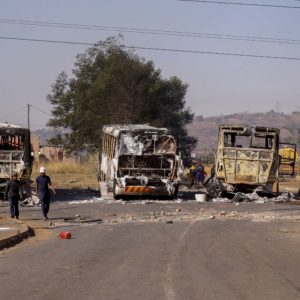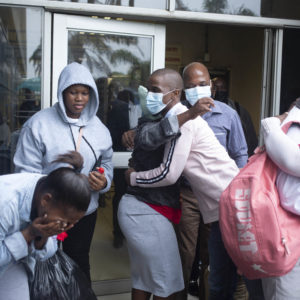Injustice stalks dissent
As three activists walked free after six months in jail, it was again clear that the ANC, in cahoots with the police and justice system, keeps grinding popular dissent against the rock of repressio…
Author:
1 October 2021

One of the many dimensions of the escalating crisis of South African society is the general – though not uniform – sense of impunity for elite criminality. There is a long list of well-known figures who, following reports in the media, appear to be guilty of serious offences in the public understanding. Markus Jooste and Floyd Shivambu are prominent examples, but there are many others.
Violent acts have been carried out in public without any sort of legal consequences. They range from the people claiming to be Umkhonto weSizwe veterans who openly attacked migrants in central Durban earlier this year to the many, and usually violent, evictions that the municipality in that city has carried out in brazen violation of the law, court orders and, recently, Covid-19 regulations.
There has also been a marked unwillingness to investigate and prosecute people who have undertaken violent acts that appear to be linked to the factional battles in the ANC. One example is the impunity that was granted to the people who attacked and burnt trucks on the N3 for so long.
Related article:
There are also more everyday forms of criminality that have been carried out with impunity.
There is a vast swathe of local officials and politicians whose names are not known to the general public, but whose cynical delinquency is all too evident in the collapse of small towns into rot and filth.
And, of course, there are the everyday experiences of an increasingly predatory state, such as the routine extortion of the public at the hands of the police. Corruption is so normalised that in the magistrate’s court in Durban, even the police officers stationed in the courtrooms have no shame in openly demanding a bribe from the friends and family of an accused to enter the courtroom.
New modes of repression
The rot in the state is not solely a matter of it becoming an instrument for an increasingly predatory and, in some parts of the country, violent political class to appropriate private wealth from the common wealth. Parts of it have also been captured and instrumentalised in different ways by different parts of the predatory political class to contain dissent.
The ANC has always been hostile to autonomous popular organisation. All of the first generation of social movements to emerge around 20 years ago – such as the Treatment Action Campaign, the Western Cape Anti-Eviction Campaign and the Landless People’s Movement – were met with paranoia and varying degrees of state violence and repression.
Related article:
These days, much repression is planned and executed outside the formal structures of the state. In some parts of the country, death threats and assassinations have often been used to contain popular dissent. But these modes of repression function with the formal structures of the state in two ways. The first is that they are seldom investigated, thus allowing a large degree of impunity. The second is that they are often accompanied by police harassment and exclusion from access to the forms of social support mediated through local political structures such as access to work, services and housing.
Local actors can act with impunity to crush independent organising and drive bits of the local state to take effective action with the same purpose. In some parts of the country, it is common for local councillors to simply instruct the police who to arrest and for the police to carry out these instructions without regard for the law.
Arrests are routinely made with no intention of going to trial, but with the sole purpose of harassing activists through assault in the holding cells and repeated court appearances, sometimes over years, before charges are dropped. In some cases, this can mean a lengthy period of imprisonment.
Favouring the rich
This is compounded by the profound contempt with which the criminal justice system treats impoverished people. Usually, wealth means that things speed up – there is a lot less queuing and waiting. In the courts, this is reversed. For a person without money and relying on legal aid for representation, an appearance in the dock is so rushed that it can be over in two minutes, with both the prosecutor and the lawyer for the defence looking at the relevant papers for the first time during the brief moment in which the accused stands in the dock. For a person with money and an expensive advocate, everything slows right down. Careful consideration is given to the evidence and the law. A decision to sustain a case, or deny a person bail, will not be taken lightly.
To place an impoverished person in the criminal justice system is to place them in a grinding machine that mutilates lives as an inevitable part of its everyday functioning. Our prisons are full of impoverished people who have been waiting for two or three years for their cases to be heard. For this reason accusation, no matter how baseless, can itself be a sentence.
Related article:
This week, New Frame and other social justice media – namely GroundUp and Maverick Citizen – reported on the case of Lindokuhle Mnguni, Landu Tshazi and Ayanda Ngila. They are members of Abahlali baseMjondolo who spent six months enduring the horrors of Westville prison and being repeatedly denied bail after they were arrested on a murder charge for which, in the end, the state admitted it had no credible evidence.
Mnguni, Tshazi and Ngila were leading figures in developing eKhenana – initially a fairly standard land occupation in Durban – into a remarkable experiment in democratic self-organisation. Vegetables were grown, poultry reared and a cooperative shop established to sell the produce. Services were installed and a community hall, youth centre and a political school built. All of this was undertaken on a collective basis, with labour and profits being shared.
Joining the dots
In April, the Daily Maverick ran an article under the headline “Land occupiers’ group starts ‘socialist’ commune in eThekwini” with a drone photograph showing some of the material infrastructure that has been built. A month later, Mnguni, Tshazi and Ngila were in prison.
When Mqapheli Bonono, the deputy president of Abahlali baseMjondolo, called a meeting of the residents after the arrests to discuss the situation and find out what had happened, he was also arrested, along with Maphiwe Gasela and Siniko Miya. Bonono and Gasela would spend two weeks in prison, while Miya had to suffer six months’ incarceration.
Related article:
On Wednesday 29 September, all charges were dropped against Mnguni, Tshazi and Ngila and they walked out of court into the soft spring rain. On Friday 1 October, the case against Bonono, Gasela and Miya was postponed once again. A request to relax the bail conditions of Bonono and Gasela was denied.
Jooste and Shivambu, along with a host of minor figures who have stolen from the public, have not had to step into the dock with their expensive advocates ready to slow the legal process down and insist that every step of that process is tested from every angle. Yet three young men who tried to build something decent in the detritus of a society that had treated them with utter contempt were taken to prison.
This is who we are.




